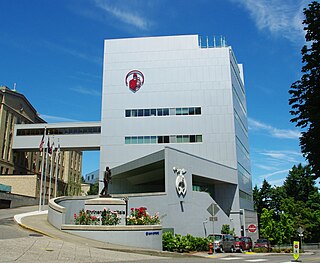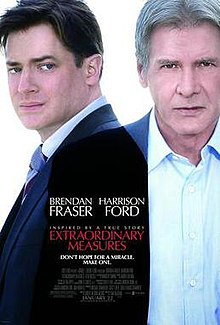
Keri Lynn Russell is an American actress. She portrayed the titular character on the drama series Felicity (1998–2002), which won her a Golden Globe Award, and Elizabeth Jennings on the FX spy thriller series The Americans (2013–2018), which earned her nominations for several Primetime Emmy and Golden Globe Awards.
Sanofi S.A. is a French multinational pharmaceutical and healthcare company headquartered in Paris, France. Originally, the corporation was established in 1973 and merged with Synthélabo in 1999 to form Sanofi-Synthélabo. In 2004, Sanofi-Synthélabo merged with Aventis and renamed to Sanofi-Aventis, which were each the product of several previous mergers. It changed its name back to Sanofi in May 2011. The company is a component of the Euro Stoxx 50 stock market index.

Alan Douglas Ruck is an American actor. He is best known for portraying Cameron Frye, Ferris Bueller's best friend, in John Hughes's film Ferris Bueller's Day Off (1986); Stuart Bondek, a lecherous, power-hungry member of the mayor's staff in the ABC sitcom Spin City; and Connor Roy, the eldest son of a media magnate, in the HBO series Succession. His other notable parts include those in Bad Boys (1983), Three Fugitives (1989), Young Guns II (1990), Speed (1994), and Twister (1996). In 2016, he co-starred with Geena Davis in an updated Fox TV adaptation of William Peter Blatty's best-selling novel The Exorcist.

Glycogen storage disease type II, also called Pompe disease, is an autosomal recessive metabolic disorder which damages muscle and nerve cells throughout the body. It is caused by an accumulation of glycogen in the lysosome due to deficiency of the lysosomal acid alpha-glucosidase enzyme. It is the only glycogen storage disease with a defect in lysosomal metabolism, and the first glycogen storage disease to be identified, in 1932 by the Dutch pathologist J. C. Pompe.

Joel David Moore is an American character actor and director. Born and raised in Portland, Oregon, Moore studied acting in college before relocating to Los Angeles to pursue a film career. His first major role was as Owen Dittman in the 2004 comedy Dodgeball: A True Underdog Story, followed by roles in the comedy Grandma's Boy (2006), Terry Zwigoff's Art School Confidential (2006), and the independent slasher film Hatchet (2006).
Oregon Health & Science University (OHSU) is a public research university focusing primarily on health sciences with a main campus, including two hospitals, in Portland, Oregon. The institution was founded in 1887 as the University of Oregon Medical Department and later became the University of Oregon Medical School. In 1974, the campus became an independent, self-governed institution called the University of Oregon Health Sciences Center, combining state dentistry, medicine, nursing, and public health programs into a single center. It was renamed Oregon Health Sciences University in 1981 and took its current name in 2001, as part of a merger with the Oregon Graduate Institute (OGI), in Hillsboro. The university has several partnership programs including a joint PharmD Pharmacy program with Oregon State University in Corvallis.

The Shriners Children's Portland is a 29-bed, non-profit pediatric hospital located in Portland, in the U.S. state of Oregon. It specializes in orthopedics, cleft lip, and palate disorders as part of the 22-hospital system belonging to the Shriners Hospitals for Children. Established in 1924, the current campus opened in 1983. The hospital is located on the Oregon Health and Science University campus, and is active in the research and development of new technology.
The Duke University School of Medicine, commonly known as Duke Med, is the medical school of Duke University. It is located in the Collegiate Gothic-style West Campus of Duke University in Durham, North Carolina. The School of Medicine, along with the Duke University School of Nursing, Duke University Hospital, Duke Regional Hospital, Duke Children's Hospital, Duke Raleigh Hospital, and other affiliated hospitals, clinics, and laboratories, make up the Duke University Health System. Established in 1925 by James B. Duke, the School of Medicine has earned its reputation as an integral part of one of the world's foremost patient care and biomedical research institutions.

Man's Best Friend is a 1993 American science fiction horror film, directed and written by John Lafia. It stars Ally Sheedy, Lance Henriksen, Robert Costanzo, Frederic Lehne, John Cassini, and J. D. Daniels.
Sheridan Gray Snyder OBE is an entrepreneur, venture capitalist, and philanthropist in the biotechnology industry. He is the founder and CEO of Biocatalyst, but also a "serial entrepreneur", a founder of Genzyme and many other companies. Snyder, who was the University of Virginia's best tennis player when he was studying for his BA in French and Romance Languages there in the 1960s, made "major contributions to the popularisation of tennis in the USA." He co-founded the National Junior Tennis League that reaches 250,000 inner-city young people and constructed a new tennis center at the University of Virginia.
Iduronidase, sold as Aldurazyme, is an enzyme with the systematic name glycosaminoglycan alpha-L-iduronohydrolase. This enzyme catalyses the hydrolysis of unsulfated alpha-L-iduronosidic linkages in dermatan sulfate.
Alglucosidase alfa, sold under the brand name Myozyme among others, is an enzyme replacement therapy (ERT) orphan drug for treatment of Pompe disease, a rare lysosomal storage disorder (LSD). Chemically, the drug is an analog of the enzyme that is deficient in patients affected by Pompe disease, alpha-glucosidase. It is the first drug available to treat this disease.

John Francis Crowley is an American biotechnology executive and entrepreneur and the chairman and CEO of Amicus Therapeutics. He co-founded Novazyme Pharmaceuticals with William Canfield, which was later acquired by Genzyme Corporation, and founded Orexigen Therapeutics. In 2006, he was profiled in the book The Cure: How a Father Raised $100 Million – And Bucked the Medical Establishment – In a Quest to Save His Children by Geeta Anand. In 2010, Crowley released his memoir, Chasing Miracles: The Crowley Family Journey of Strength, Hope, and Joy. Crowley and his family were the inspiration for the movie Extraordinary Measures starring Harrison Ford and Brendan Fraser in 2010.

Brian J. Druker is a physician-scientist at Oregon Health & Science University, in Portland, Oregon. He is the director of OHSU's Knight Cancer Institute, Jeld-Wen Chair of Leukemia Research, and professor of medicine. In 2009, he won the Lasker-DeBakey Clinical Medical Research Award and the Meyenburg Award for his influential work in the development of imatinib for the treatment of chronic myeloid leukemia (CML). He has been called "Oregon's best-known scientist".
William Canfield is a glycobiologist, chief scientific officer and founder of an Oklahoma City-based biotechnology company, Novazyme, which was acquired by Genzyme in August 2001 and developed, among other things, an enzyme that can stabilize Pompe disease, based on Canfield's ongoing research since 1998. Canfield subsequently left Genzyme and established, with his partner in the Novazyme operation, John Crowley, another research laboratory, which he still heads. He saved Cytovance from bankruptcy by forming an investor group and raising $9 million after Crowley suddenly left the lab in 2005 to become the chief executive officer at Amicus Therapeutics in New Jersey

Henri A. Termeer was a Dutch biotechnology executive and entrepreneur who is considered a pioneer in corporate strategy in the biotechnology industry for his tenure as CEO at Genzyme. Termeer created a business model adopted by many others in the biotech industry by garnering steep prices— mainly from insurers and government payers— for therapies for rare genetic disorders known as orphan diseases that mainly affect children. Genzyme uses biological processes to manufacture drugs that are not easily copied by generic-drug makers. The drugs are also protected by orphan drug acts in various countries which provides extensive protection from competition and ensures coverage by publicly funded insurers. As CEO of Genzyme from 1981 to 2011, he developed corporate strategies for growth including optimizing institutional embeddedness nurturing vast networks of influential groups and clusters: doctors, private equity, patient-groups, insurance, healthcare umbrella organizations, state and local government, and alumni. Termeer was "connected to 311 board members in 17 different organizations across 20 different industries" He has the legacy of being the "longest-serving CEO in the biotechnology industry.

Ionis Pharmaceuticals, Inc. is a biotechnology company based in Carlsbad, California, that specializes in discovering and developing RNA-targeted therapeutics. The company has 3 commercially approved medicines: Spinraza (Nusinersen), Tegsedi (Inotersen), and Waylivra (Volanesorsen) and has 4 drugs in pivotal studies: tominersen for Huntington’s disease, tofersen for SOD1-ALS, AKCEA-APO(a)-LRx for cardiovascular disease, and AKCEA-TTR-LRx for all forms of TTR amyloidosis.

Markus Grompe is a professor of Pediatrics and practicing physician at Oregon Health & Science University. since 1991. Since 2004, he has been director of the Oregon Stem Cell Center at OHSU. Until 2018, he was also director of the Papé Family Pediatric Research Institute, Vice Chair for research in the OHSU department of Pediatrics, and holder of the Ray Hickey Endowed Chair at Doernbecher Children's Hospital.
Yuan-Tsong Chen is a Taiwanese physician scientist, notable for his work on human genetic disorders. He is the director emeritus (2001–2010) and distinguished research fellow (2001–present) of the Institute of Biomedical Sciences, Academia Sinica, Taiwan, and also tenured professor of pediatrics of Duke University (1993–present) Chen was a 2019 awardee of Taiwan's Presidential Science Award, as were Yuan-Pern Lee and Wei Fu-chan.
Avalglucosidase alfa, sold under the brand name Nexviazyme, is an enzyme replacement therapy medication used for the treatment of glycogen storage disease type II.












